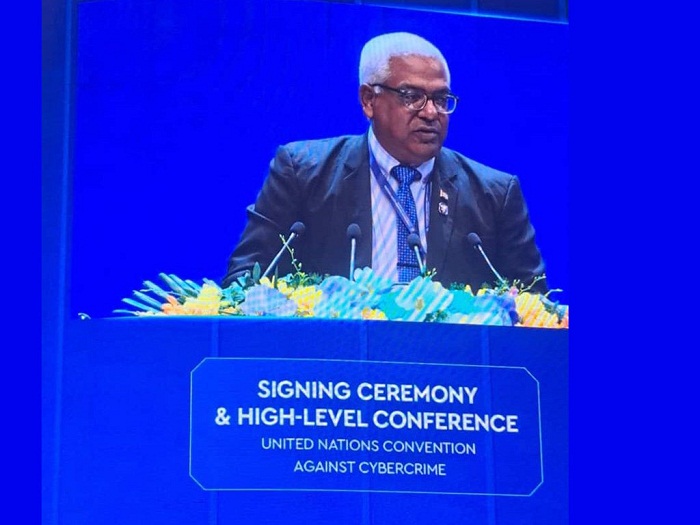Cuban Minister of Justice Oscar Silvera denounced this Sunday in Hanoi, the capital of Vietnam, that cyberspace is unfortunately being used as a theater of operations to carry out acts of aggression and unconventional warfare against sovereign states.
Speaking at the High-Level Segment for the signing of the UN Convention against Cybercrime, he emphasized:
Cuba has been and is the victim of hostile and politically motivated use of digital platforms, aimed at subverting our internal order, inciting violence, and destabilizing the country.”
Silvera emphasized that this type of action must be categorically rejected by the international community, adding that it is also impossible to speak of an effective and equitable fight against cybercrime without denouncing the impact of unilateral coercive measures.
The economic, commercial, and financial blockade imposed by the United States government against Cuba, as well as the inclusion of our country on the illegitimate list of state sponsors of terrorism, severely limits our access to technologies, software, platforms, and training,” he charged.
He emphasized that this policy not only violates international law but also creates a digital divide that makes us more vulnerable to cyberthreats.
“True global cooperation against cybercrime is incompatible with the existence of blockades and sanctions that prevent countries from strengthening their defense capabilities,” he asserted.
The Cuban Minister of Justice stated in another part of his speech that “by signing this Convention, Cuba reaffirms its commitment to multilateralism and to building a peaceful, secure, and resilient cyberspace that serves the sustainable development of our peoples.”
We do so with the conviction that only through transparent, inclusive, and sovereignty-respecting cooperation can we successfully face the challenges of the digital age,” he insisted.
Silvera considered that the adoption and signing of the so-called Hanoi Convention represents a crucial step in building a multilateral legal framework essential for governing an area as vital and complex as cyberspace. However, he warned, we cannot consider the road to completion.
He commented that, while this instrument constitutes an important step in combating cybercrime, important issues such as cyberterrorism and the use of computer systems to subvert the constitutional order of states, among other forms of crime, are not yet reflected in its text.
This Convention must be a tool for genuine cooperation, not for interference,” he emphasized.
He reiterated that Cuba advocates that collaboration in this area be based on strict respect for the principles of the UN Charter, in particular, the sovereign equality of states, non-intervention in internal affairs, and territorial integrity.
He also referred to the solid national legal framework his country has in place to guarantee a safe cyberspace that serves the well-being of our society, which, he asserted, is fully in line with the spirit and objectives of the Hanoi Convention.
[ SOURCE: PRENSA LATINA ]

